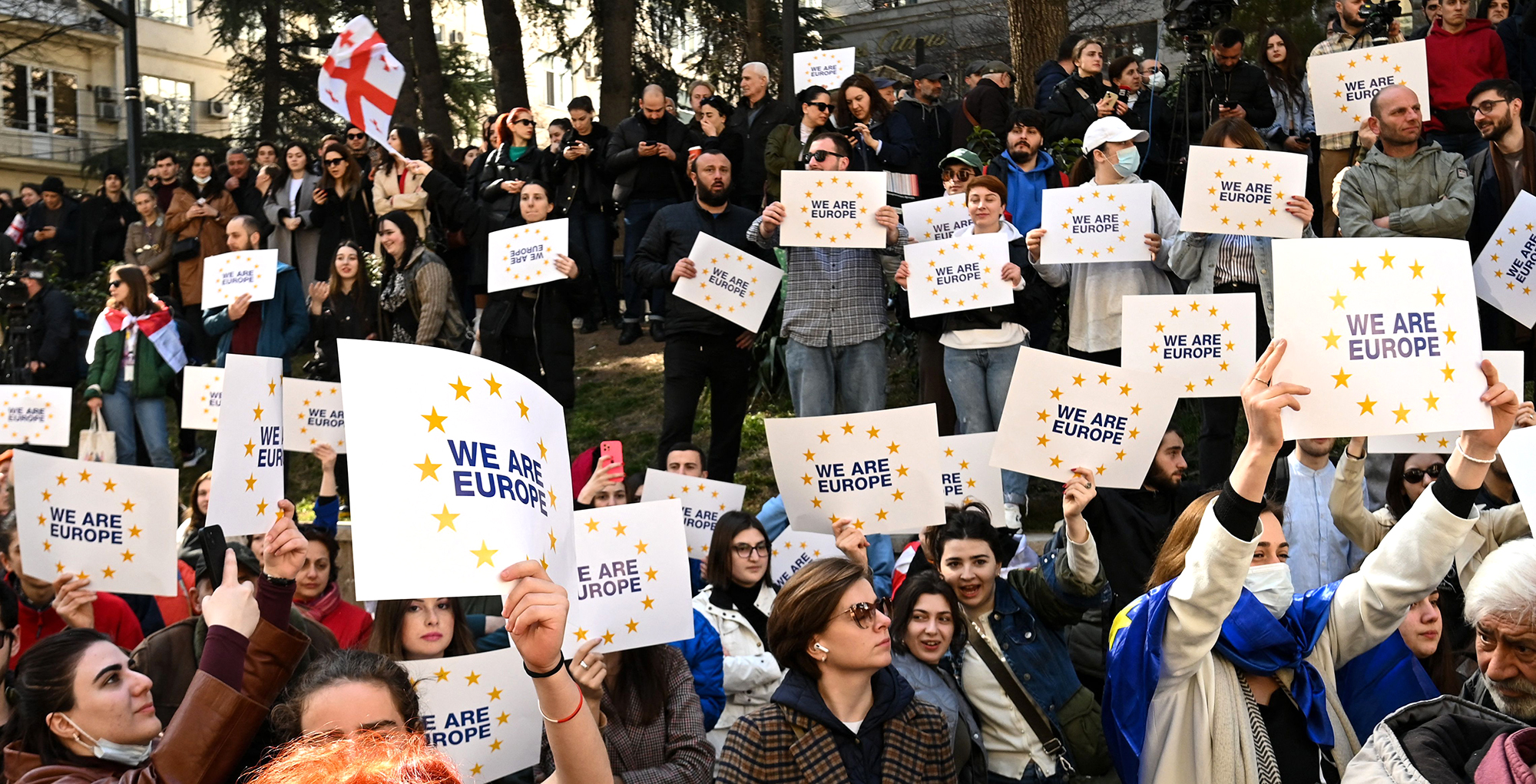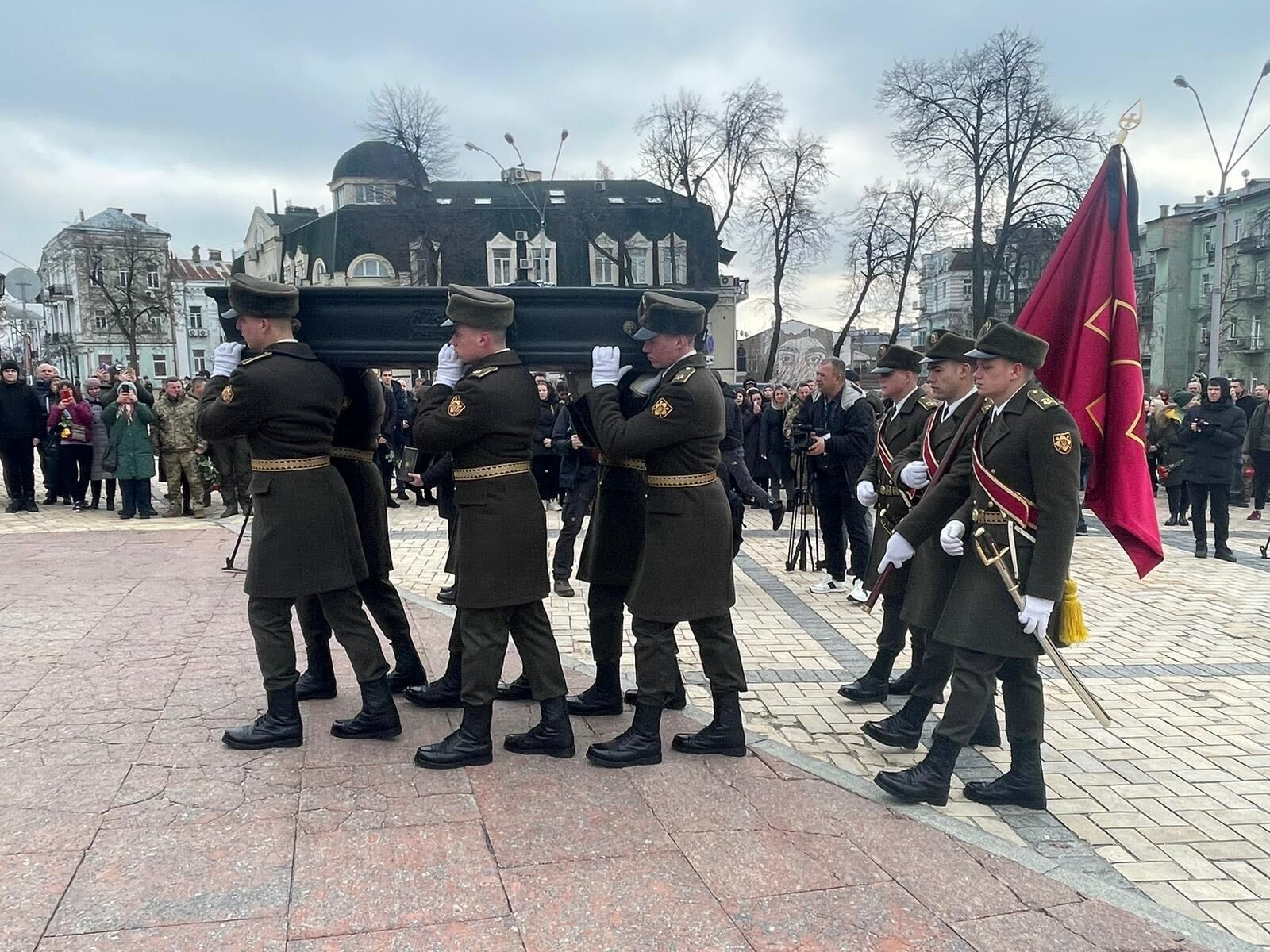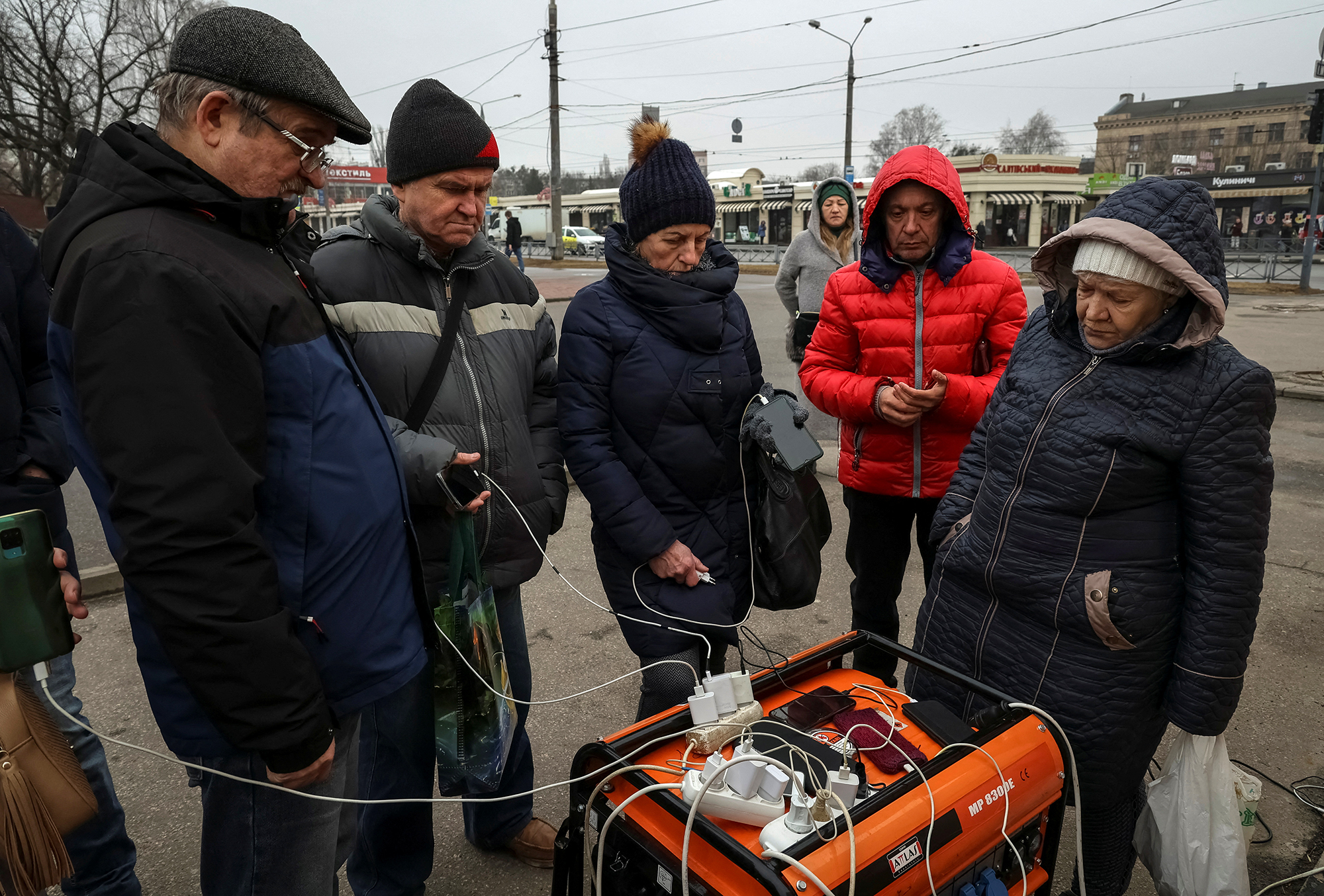
‘They are using new types of weapons, and they are seeing how our air defense systems can cope with it,’ adviser to Zelensky says. ‘They are not coping well’

US intelligence believes individuals with Russian ties trying to stir insurrection against Moldovan leaders
From CNN’s Natasha Bertrand
The US intelligence community believes that individuals with ties to Russian intelligence are planning to stage protests in Moldova to try to foment a manufactured insurrection against the Moldovan government, with the ultimate goal of seeing a more pro-Russia administration installed there, White House officials said Friday.
The US believes that Russia is working to weaken the Moldovan government, the officials said, which is seeking closer ties with the European Union. The US is also seeing signs that Russian government-linked actors could provide training to anti-government demonstrators in Moldova. Chisinau has been rocked by anti-government protests in recent weeks, largely organized by Moldova’s Russia-friendly Shor Party.
The US also believes that Moscow is working to sow disinformation about Moldova’s overall stability. One example was the Russian Ministry of Defense’s claim last month that Ukraine has been planning to invade Transnistria, Moldova’s Moscow-backed separatist region.
US officials said those allegations are “unfounded, false, and create baseless alarm.”
Moldova’s President, Maia Sandu, said publicly last month that she believes the Russian government was planning “a series of actions involving saboteurs who have undergone military training and are disguised as civilians to carry out violent actions, attacks on government buildings and hostage-taking.”
Moldova has been a flashpoint on the periphery of Russia’s invasion of Ukraine for the past year, with Russian missiles crossing into Moldovan airspace on several occasions, including this past February.
The Biden administration sees no immediate military threat to Moldova, officials said. But the US has been watching Russia’s activities in Moldova closely, wary of Russia’s ongoing efforts to destabilize Europe. President Joe Biden met with Sandu last month in Warsaw, where they discussed Russian malign influence activities.
The US Treasury sanctioned nine individuals and 12 entities in October that the US believed to be involved in working to destabilize Moldova.
CNN’s Rob Picheta contributed to this post.
Wagner head says private military company is opening new “recruitment centers” in over 40 cities across Russia
From CNN’s Katharina Krebs and Radina Gigova
The head of Wagner private military company, Yevgeny Prigozhin, announced on Friday the opening of dozens of new “recruitment centers” across Russia, according to a statement published by his holding company, Concord.
“Wagner group recruitment centers have opened in 42 cities of the Russian Federation,” Prigozhin is quoted as saying in the statement. “New fighters will be coming there, who will go with us side by side to defend their country and their families. To create our common future and protect the memory of the past.”
“Despite the colossal resistance of the Armed Forces of Ukraine, we will move forward. Despite the sticks that are stuck in our wheels at every step, we will overcome this together,” he added.
In addition to the statement by Prigozhin, the Concord press service also published a document that includes a list with the addresses and telephone numbers of the alleged recruitment centers.
The majority of those recruitment centers appear to be gyms and sports centers, according to the names listed in the document.
Many of the alleged recruitment centers are in Moscow, where the document claims eight such centers will be opened. Saint Petersburg has the second-largest number of centers, with five, according to the document.
Other cities where alleged recruitment centers will be opened include Krasnodar, Kaliningrad, Irkutsk, Novosibirsk, Yekaterinburg and Murmansk.
CNN in unable to independently verify Prigozhin’s claims about the opening and operations of the alleged centers.
The Wagner group has been active throughout the war in Ukraine, and Prigozhin has recently been outspoken about ammunition issues, placing the blame for his fighters’ deaths on Russia’s defense ministry.
Russia hit Ukraine with hypersonic missiles in its latest barrage. Here’s what to know about the weapons.
From CNN’s Rob Picheta
When Russia launched a total of 95 missiles at major cities across Ukraine on Thursday morning, it included six Kinzhal ballistic missiles that eluded Kyiv’s air defenses, the Ukrainian military said.
“The attack is really large-scale and for the first time using such different types of missiles. We see that this time as many as six Kinzhal were used. This is an attack like I don’t remember seeing before,” Yurii Ihnat, spokesperson for the Air Force Command of Ukraine, said on Ukrainian television Thursday.
“So far, we have no capabilities to counter these weapons,” he added, referring to the Kinzhals, plus six X-22 air-launched cruise missiles that were also launched by Russian forces.
Russia used the nuclear-capable Kinzhal missile, which it has described as a hypersonic weapon, on a few occasions in the first weeks of its invasion last year. But the powerful weapon has rarely been seen over the country’s skies. Its first known use was last March, and then in May, according to the Center for Strategic and International Studies (CSIS).
The use of such a wide and unpredictable array of weaponry seemingly marks a shift in the Kremlin’s strategy.
About the Kinzhal: It is an air-launched variant of the Iskander short-range ballistic missile (SRBM) which has also, more frequently, been used in Ukraine, and was unveiled by Russian President Vladimir Putin in 2018 as a cornerstone of a modernized Russian arsenal.
Like virtually all ballistic missiles it is hypersonic, which means they travel at least five times the speed of sound, but it is also particularly difficult to detect because it can be launched from MiG-31 fighter jets, giving it a longer range and the ability to attack from multiple directions.
Foreign students who fled Ukraine at the beginning of war remain in limbo
From CNN’s Stephanie Busari and Nimi Princewill

Ukraine’s strong reputation for medical courses and affordable tuition had attracted more than 70,000 international students to the country. But as they fled the country at the onset of Russia’s invasion, many say they faced segregation and racism at Ukraine’s borders
One African medical student told CNN at the time that she and other foreigners were ordered off a public transit bus at a border checkpoint between Ukraine and Poland and asked to stand aside as the bus drove off with only Ukrainian nationals on board. The Border Guard Service of Ukraine told CNN at the time that the claims were untrue.
One year on, some of the students tell CNN they are in limbo:
Facing deportation: While hundreds of students were evacuated from Ukraine by their own countries, some stayed in the bordering European nations to which they had fled. Many are yet to be granted refugee status, said Korrine Sky, 26, a British-Zimbabwean citizen, adding that she has been in contact with some foreign students.
“Some were given between six months to one-year visas. As of February and March, a lot of the visas that they were granted at the start of the war, will be running out. So, they’ll be facing deportation. A lot of them have decided to go back to Ukraine,” Sky told CNN in a phone call from her home in Leicester, England.
“There’s also a large portion of students who’ve now gone back to Ukraine because their universities weren’t offering transcripts unless they return,” she added.
CNN has contacted the Ministry of Education and the minister for comment.
Unable to continue education: After fleeing the conflict, Sky said she hoped to complete her education at other European universities that had offered a place to international students displaced by the Russian war. However, her hopes were soon dashed after she discovered the scholarship opportunities were reserved mainly for Ukrainian students.
“That’s the same sentiments we’d had when we were trying to get on the buses and the trains (while fleeing the war) … It was Ukrainians only. No one seems to even have a single bit of empathy that our lives have been completely disrupted,” she said. “There’s a lot going on in the world at the moment… so we are lower down in the list of priorities.”
Mandatory exams in Ukraine: Some Ukrainian universities are mandating that students return in March to complete exams in order to graduate.
Students are protesting, writing in a statement that organizers are aware of the risks of traveling to Ukraine, with no insurance or direct flights available. CNN reviewed a consent form issued by Kyiv Medical University to students, stating that students take responsibility for all risks involved in traveling to Ukraine. CNN has contacted Kyiv Medical University for comment.
The Dean of International Students Faculty at the Ternopil National Medical University said its exams for students is currently being organized by the health ministry, and that the university will arrange another round of exams for international students who are unable to come. No timeline was provided for facilitating the exam outside Ukraine. CNN has contacted Ukraine’s ministry of health for further comments.
Graduates are also facing issues: Nigerian student Adetomiwa Adeniyi, 25, only had a few months of studies remaining when the war broke out. So he says he was able to finish the education online and receive a degree. Now, Adeniyi is unable to practice as a doctor, because Nigeria’s medical council (MDCN) does not recognize medical degrees acquired digitally.
He says he might be forced to repeat his final year in a Nigerian university or find a country abroad that will allow him to practice.
Costs put everything on hold: For fourth-year medical student Oyindamola Morenikeji from Nigeria, “everything is just at a standstill,” as she told CNN of her failed attempts to transfer to another European school, after her family already had a tough time funding her $4,000 per year education in Ukraine.
Morenikeji says she is considering applying to a Nigerian nursing school and starting all over again but is worried about the financial toll on her family. “It feels like when they were close to the final point, everything came crashing,” she told CNN.
Georgia revokes Russia-inspired bill after major protests. Here’s what you need to know
From CNN Staff

Thousands protested in Tbilisi for two nights, prompting Georgia’s parliament to formally revoked a controversial “foreign influence” bill on Friday. There were concerns that it resembled Russian laws used to stifle political dissent.
Here’s what you need to know:
Bills spark protest: Lawmakers were discussing two bills, according to Giorgi Gogia, associate director of the Europe and Central Asia Division at Human Rights Watch.
The first bill would have required organizations including non-governmental groups and print, online and broadcast media to register as “foreign agents” if they receive 20% or more of their annual income from abroad. The second expanded the scope of “agents of foreign influence” to include individuals and increases the penalties for failure to comply from fines to up to five years in prison.
Advocates of the laws said they would help root out those working against Georgia’s interests, Reuters reported. Human Rights Watch’s Gogia said the bills would “threaten to marginalize and discredit critical voices in the country.”
Russia-aligned Belarus has had a citizenship law in place since 2002 that has a similar impact.
The President of Georgia, Salome Zourabichvili, posted a video message on Facebook, expressing concerns that the bills could impede the country’s hopes of closer ties with the European Union. She threw her support behind the protesters and pledged to veto.
Protests erupt: Thousands of protesters could be seen outside the parliament building on for two nights, holding not just the Georgian flag but also European Union flags.
Some threw stones and petrol bombs, as security forces responded with tear gas and water cannon. Video posted on social media also showed protesters storming a barricade at the entrance to the parliament building and tearing it down. At least 76 people have been arrested in connection to the protests.
Protesters’ chants, with insults aimed at both Georgian politicians and Russian President Vladimir Putin, underline fears that the bill follows the model of a controversial law in neighboring Russia that has already imposed draconian restrictions and requirements on organizations and individuals with foreign ties.
Georgia was part of Soviet Union and today, it hopes to integrate with the EU: Georgia won its independence from the Soviet Union in 1991, and has since sought to strike a diplomatic balance between its citizens’ pro-European stance and the geopolitical ambitions of its powerful neighbor, Russia.
Georgia applied for EU membership in March 2022. Though it was not granted candidacy status, the European Council has expressed readiness to grant that status if Georgia implements certain reforms.
Comparisons with Ukraine: The think tank European Council on Foreign Relations (ECFR) drew comparisons between the situation in Georgia and Russia’s invasions of Ukraine in 2014 and 2022.
Former Russian President Dmitry Medvedev said in 2011 that had Russia not invaded Georgia in 2008, NATO would have expanded into Georgia.
The 2008 conflict centered on South Ossetia and Abkhazia, which are two provinces that are officially part of Georgia, but they have separate governments propped up by Russia and unrecognized by most countries.
The 2008 invasion of Georgia only lasted days, but it appeared to have the same revanchist ambitions that drove Putin’s invasions of Ukraine in 2014 and last year, writes the ECFR.
Where things stand now: Georgian lawmakers voted against the bill in its second reading by a margin of 35 to one, according to Georgia’s public broadcaster First Channel, and this formally revoked the controversial bill that sparked the protests.
CNN’s Katharina Krebs, Jorge Engels, Rhea Mogul, Sophie Tanno, Niamh Kennedy, Hannah Ritchie and Sana Noor Haq contributed reporting.
Thousands gather to mourn decorated Ukrainian soldier known as “Da Vinci”
From CNN’s Rebecca Wright, Olha Konovalova and Ivan Watson

Thousands of people have been gathering in downtown Kyiv for the funeral of a decorated young Ukrainian military commander known as “Da Vinci,” who was killed this week in Bakhmut.
Military and civilian mourners gathered at the golden-domed St. Michael’s Monastery, many of them bringing flowers to pay their last respects to Dmytro Kotsiubaylo, who died at the age of 27.
The Orthodox church reached full capacity, so hundreds of people listened in to the ceremony from the courtyard outside.
After the funeral, a military procession carried Kotsiubaylo’s casket to the Maidan (Independence Square) for a larger public memorial.
Ukrainian President Volodymyr Zelensky awarded Kotsiubaylo with top military honors the Order of the Golden Star and the title “Hero of Ukraine” last year.
Zelensky announced Kotsiubaylo’s death in his nightly address on Tuesday, calling him a “man of courage.”
He was well-known in Ukraine, having taken up arms against Russia in 2014, when he was just 18.
In 2016, Kotsiubaylo became the youngest battalion commander in the history of the Ukrainian Army.
“One of the youngest heroes of Ukraine. One of those whose personal history, character, and courage have forever become the history, character, and courage of Ukraine,” Zelensky said.
Putin’s war in Ukraine has not changed China and Russia’s deep defense sector ties, data show
From CNN’s Simone McCarthy
Chinese state-owned defense firms have maintained trade relationships with sanctioned Russian defense companies during the past year, even as many of the world’s leading economies cut ties with Moscow and the companies driving its continued assault on Ukraine.
Customs records reviewed by CNN show that throughout 2022, through at least mid-November, Beijing-based defense contractor Poly Technologies sent at least a dozen shipments – including helicopter parts and air-to-ground radio equipment – to a state-backed Russian firm sanctioned by the US for its connection to leader Vladimir Putin’s war in Ukraine.
Poly Technology’s long-term trade partner – Ulan Ude Aviation Plant, a purveyor of military-grade helicopters – also continued to send parts and several helicopters to the Beijing-based company last year, trade data show.
Most of the helicopter parts included in the shipments to Russia were labeled for use in the multipurpose Mi-171E helicopter, designed for transport and search and rescue. China began importing this model of chopper from Russia more than 10 years ago, according to the Stockholm International Peace Research Institute (SIPRI).
Three shipments from Poly Technologies were labeled as including products for the operation or service of the Russian-made Mi-171SH, a military transport helicopter that can be equipped with weapons and has been used in Moscow’s operations in Ukraine.
The customs records came from two data sets. The first was provided by trade data firm Import Genius, whose information is collated by secondary sources from official Russian customs and shipment records. Washington-based think tank C4ADS, which collates official customs records aggregated from multiple third-party providers, provided the second set.
CNN has not independently verified the data, which may provide a partial but not complete picture of the trade.
Read more here.
Russia has been capturing some US-provided weapons to Ukraine and sending them to Iran, sources say
From CNN’s Natasha Bertrand
Russia has been capturing some of the US and NATO-provided weapons and equipment left on the battlefield in Ukraine and sending them to Iran, where the US believes Tehran will try to reverse-engineer the systems, four sources familiar with the matter told CNN.
Over the last year, US, NATO and other Western officials have seen several instances of Russian forces seizing smaller, shoulder-fired weapons equipment, including Javelin anti-tank and Stinger anti-aircraft systems that Ukrainian forces have at times been forced to leave behind on the battlefield, the sources told CNN.
In many of those cases, Russia has then flown the equipment to Iran to dismantle and analyze, likely so the Iranian military can attempt to make their own version of the weapons, sources said. Russia believes that continuing to provide captured Western weapons to Iran will incentivize Tehran to maintain its support for Russia’s war in Ukraine, the sources said.
US officials don’t believe that the issue is widespread or systematic, and the Ukrainian military has made it a habit since the beginning of the war to report to the Pentagon any losses of US-provided equipment to Russian forces, officials said. Still, US officials acknowledge that the issue is difficult to track.
It’s not clear if Iran has successfully reverse-engineered any US weapons taken in Ukraine, but Tehran has proven highly adept at developing weapons systems based on US equipment seized in the past.
A key weapon in Iran’s inventory, the Toophan anti-tank guided missile, was reverse engineered from the American BGM-71 TOW missile in the 1970s. The Iranians also intercepted a US-made drone in 2011, a Lockheed Martin RQ-170 “Sentinel,” and reverse-engineered it to create a new drone that crossed into Israeli airspace in 2018 before being shot down.
The coordination is yet another example of Moscow’s growing defense partnership with Tehran, which has intensified over the last year as Russia has become increasingly desperate for external military support for its war against Ukraine. The partnership is not only further destabilizing Ukraine, but it could also threaten Iran’s neighbors in the Middle East, National Security Council spokesperson John Kirby said last month.
CNN has reached out to the Russian embassy in Washington and the Iranian UN mission for comment.
Nearly half a million people without power in Ukraine’s second-largest city
From CNN’s Olga Voitovych in Kyiv

Nearly half a million people are without power in Ukraine’s second-largest city, Kharkiv, after Thursday’s Russian missile strike, according to regional governor Oleh Syniehubov.
“The power supply is still cut off to 470,000 consumers in Kharkiv city and 50,000 in the region,” said Syniehubov in a Telegram post Friday.
However “critical infrastructure and some consumers have been powered,” he added.
In the wider Kharkiv region, more than 90% of consumers have had their electricity supply restored, Syniehubov said.
Some context: Russia has launched a total of 95 missiles of various types over the past day, and 34 of them were intercepted, the Ukrainian military said on Friday.
Source: https://www.cnn.com/europe/live-news/russia-ukraine-war-news-03-10-23/index.html

















